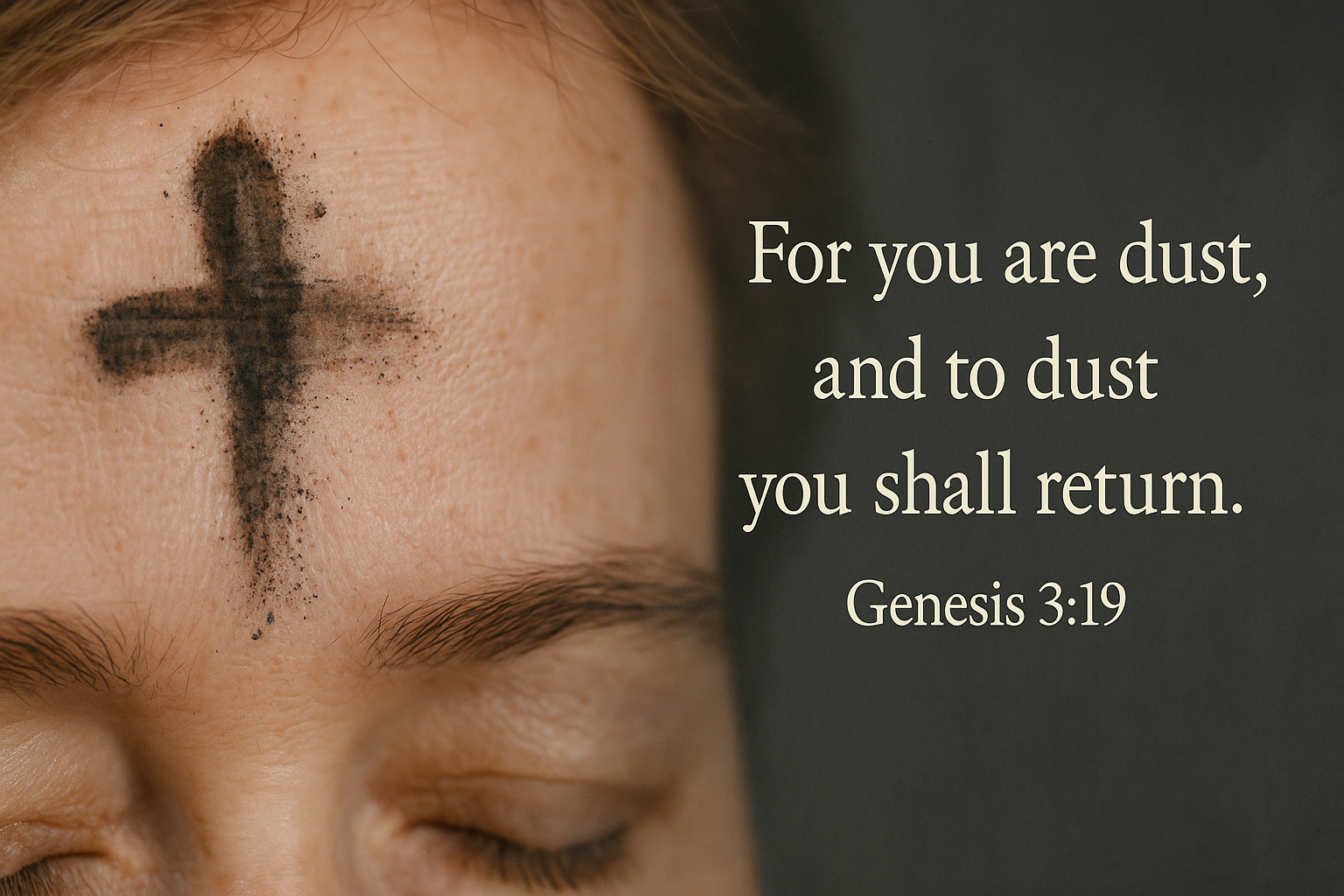What Is Ash Wednesday?
Ash Wednesday is the first day of Lent, a season in the liturgical church calendar that is dedicated to preparing minds, hearts and souls for Easter. On this day, many denominations around the world– including Catholics, Anglicans, Lutherans, and others–hold a special service where the priest/pastor will dip a thumb in a bowl of ashes and make the sign of the cross on a congregant’s forehead. The ashes, made by burning the palm branches from the previous year’s Palm Sunday, serve as a poignant reminder of our sin, our need for repentance, and our mortality—"from dust you came, and to dust you shall return." They are not required by God, but are meant to be a solemn reminder every time we look in the mirror that day.
How Does Ash Wednesday Begin the Journey of Lent?
Ash Wednesday marks the start of the 40-day Lenten season–a time in which Christians are called to prayer, fasting, and repentance before celebrating Easter. The 40 days (excluding Sundays) reflect the time that Jesus spent in the wilderness being prepared for His public ministry. In a similar way, Christians are challenged to maintain a posture of humility, acknowledging our dependence on God’s grace and mercy. Lent is a time to study and reflect on our thoughts, actions, and attitudes that separate us from the life God intends for His children.
In her article, “What Is Lent? It's Meaning, Importance, and Fasting Explained”, Sarah Phillips writes, “Lent is a time that offers us an opportunity to come to terms with the human condition we may spend the rest of the year running from, bringing our need for a Savior to the forefront. Lent is a time to open the doors of our hearts a little wider and understand our Lord a little deeper so that when Good Friday and Easter come, it is not just another day at church but an opportunity to receive the overflowing graces God has to offer.
When Is Ash Wednesday and How Is It Observed?
Ash Wednesday always occurs 46 days before Easter–40 days of Lent plus the six Sundays (which are not traditionally observed as fasting days). In 2026, Ash Wednesday will take place on February 18. Since Easter is always the first Sunday after the first full moon following the spring equinox, the dates for Easter, and therefore Ash Wednesday, vary from year to year.
For denominations that observe Ash Wednesday as part of a liturgical calendar, there is a special service on that day, which includes the imposition of ashes. The Episcopal Book of Common Prayer shares a bit of the history of Ash Wednesday in one of the readings offered by the priest:
The first Christians observed with great
devotion the days of our Lord's passion and resurrection, and
it became the custom of the Church to prepare for them by a season of penitence and fasting. This season of Lent provided
a time in which converts to the faith were prepared for Holy
Baptism. It was also a time when those who, because of
notorious sins, had been separated from the body of the faithful
were reconciled by penitence and forgiveness, and restored to
the fellowship of the Church.
This call to repentance was subsequently extended to the whole Church—not to re-earn salvation, but to renew and deepen one’s relationship with God through self-examination, confession, and spiritual growth. Ash Wednesday became a day when the whole congregation would be reminded of who they are, whose they are, what sins need to be resolved, and how they can grow closer to God.
Besides a church service, the stage is then set for the next 40 days in which people are encouraged to study the Bible, spend more time in prayer, have a regular schedule of fasting, and to be aware of the needs of the poor–and help meet those needs.
What Is the Purpose of Receiving Ashes?
The Bible has many examples, especially in the Old Testament, of people who would put ashes on their head as an acknowledgement of their sinfulness before God and deep grief, profound remorse, and humility before God. Many times, people would also put on sackcloth, a very uncomfortable material that would add to their experience and demonstrate great mourning. The placement of ashes on the forehead on Ash Wednesday mirrors this practice–reminding us of our need for self-examination and repentance.
It’s interesting to note that some people will use the ashen cross on their forehead as a passive witnessing tool. Since it is not an everyday occurrence for people to see someone with a cross on their forehead, it can open discussions about the Lord and the Christian faith. And it can be an experience that causes us to slow down and examine our relationship with Jesus. In her article, “3 Powerful Reasons Ash Wednesday Matters for Christians,” Cantice Greene writes, “Ash Wednesday alerts us that our lives serve a high purpose…In the hectic pace of contemporary living, I welcome individuals, groups, seasons, events, and rituals that direct me back to Christ. Ash Wednesday is a profound pronouncement of the finished work of Christ.”
What Does the Bible Say about Ashes and Repentance?
When we recall examples of individuals who “repented in sackcloth and ashes,” we can gain greater understanding of the gravity of this practice:
“Therefore I despise myself and repent in dust and ashes” (Job 42:6).
“They will raise their voice and cry bitterly over you; they will sprinkle dust on their heads and roll in ashes” (Ezekiel 27:30).
“So I turned to the Lord God and pleaded with him in prayer and petition, in fasting, and in sackcloth and ashes” (Daniel 9:3).
“Put on sackcloth, my people, and roll in ashes; mourn with bitter wailing as for an only son, for suddenly the destroyer will come upon us” (Jeremiah 6:26).
“Woe to you, Chorazin! Woe to you, Bethsaida! For if the miracles that were performed in you had been performed in Tyre and Sidon, they would have repented long ago, sitting in sackcloth and ashes” (Matthew 11:21).
Therefore, when someone receives ashes on Ash Wednesday, they are invited to meditate on God's mercy, their need for a deeper relationship with Him, and anything in their life that may grieve His heart.
What Are Some Bible Verses for Ash Wednesday?
Considering the tone of Ash Wednesday is self-examination, giving all of ourselves to God, asking for forgiveness, and acknowledging His sovereignty, it’s helpful to meditate on Bible verses that address these issues. I suggest the following to read through on Ash Wednesday (and throughout Lent) to keep you mindful of the spirit of the season.

Repentance
“I have declared to both Jews and Greeks that they must turn to God in repentance and have faith in our Lord Jesus” (Acts 20:24).
“Or do you show contempt for the riches of his kindness, forbearance and patience, not realizing that God’s kindness is intended to lead you to repentance?” (Romans 2:4).
“The Lord is not slow in keeping his promise, as some understand slowness. Instead he is patient with you, not wanting anyone to perish, but everyone to come to repentance” (2 Peter 3:9).
“This is what the Sovereign LORD, the Holy One of Israel, says: ‘In repentance and rest is your salvation, in quietness and trust is your strength, but you would have none of it’” (Isaiah 30:15).
Forgiveness
“But with you there is forgiveness, so that we can, with reverence, serve you” (Psalm 130:4).
This is my blood of the covenant, which is poured out for many for the forgiveness of sins” (Matthew 26:28).
“In him we have redemption through his blood, the forgiveness of sins, in accordance with the riches of God’s grace” (Ephesians 1:7).
All the prophets testify about him that everyone who believes "in him receives forgiveness of sins through his name” (Acts 10:43).
God’s Sovereignty
"I am God, and there is no other; I am God, and there is none like me, declaring the end from the beginning and from ancient times things not yet done, saying, 'My counsel shall stand, and I will accomplish all my purpose'" (Isaiah 46:9-10).
"And we know that in all things God works for the good of those who love Him, who have been called according to His purpose" (Romans 8:28).
"For by Him all things were created... all things were created through Him and for Him. He is before all things, and in Him all things hold together” (Colossians 1:16-17).
"In Him we were also chosen... according to the plan of Him who works out everything in conformity with the purpose of His will” (Ephesians 1:11).
What Is A Prayer I Can Reflect on This Ash Wednesday?
Most Merciful Heavenly Father,
As I receive the sign of the cross in ashes, I am reminded that You formed me in Your great love and mercy. I deserve nothing good apart from You, yet through Jesus’ sacrifice for my sins, I am forgiven and redeemed.
Lord, I ask that Your Holy Spirit would remind me, moment by moment, of my constant need for You. Shine a light on any sin I need to confess, and help me walk in humble repentance—knowing that while I am already forgiven, I still long to honor You in all I do.
In this sacred season, I desire to return to You fully—mind, soul, and body—declaring to the world that life with You is better than life itself. Strengthen me to fix my eyes on Jesus amid the many distractions within and around me.
It’s in Jesus’ mighty name I pray. Amen.
Read More about Ash Wednesday:
What Is The Purpose Of Lent?
What Is Ash Wednesday Why Do Christians Celebrate It?
What Is Lent Meaning History Tradition Lenten Season?
Ash Wednesday Scriptures To Reflect On Our Need For Christ
What Is The Difference Between Lent And Fasting?
An Ash Wednesday Prayer To Remember Gods Merciful Love
When Is Ash Wednesday?
Can You Eat Meat On Ash Wednesday?
Photo credit: azerberber
Mary Oelerich-Meyer is a Chicago-area freelance writer and copy editor who prayed for years for a way to write about and for the Lord. She spent 20 years writing for area healthcare organizations, interviewing doctors and clinical professionals and writing more than 1,500 articles in addition to marketing collateral materials. Important work, but not what she felt called to do. She is grateful for any opportunity to share the Lord in her writing and editing, believing that life is too short to write about anything else. Previously she served as Marketing Communications Director for a large healthcare system. She holds a B.A. in International Business and Marketing from Cornell College (the original Cornell!) When not researching or writing, she loves to spend time with her writer daughter, granddaughter, rescue doggie and husband (not always in that order).




